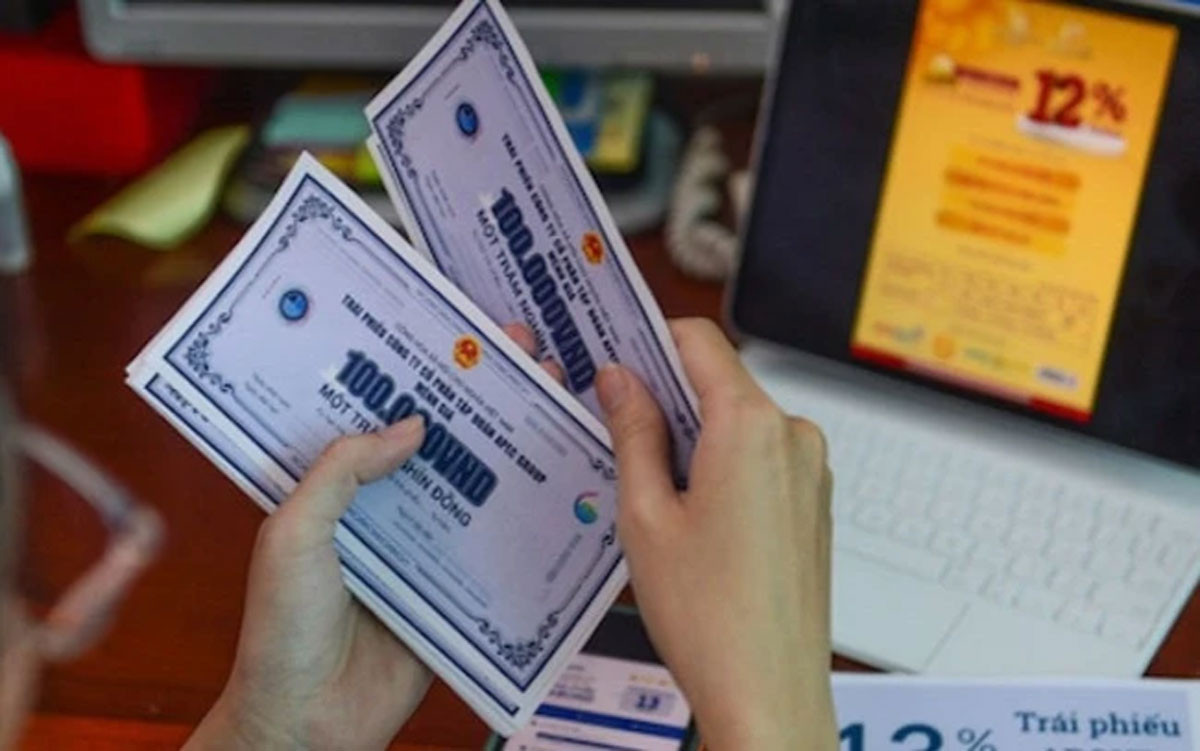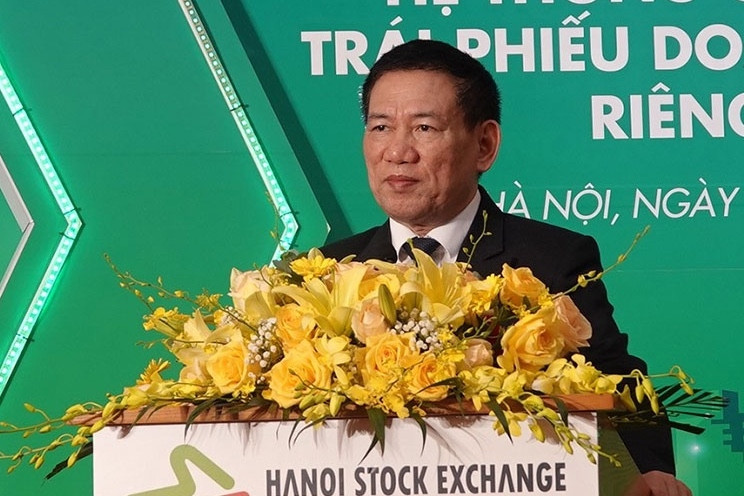Editor’s note: The corporate bond market in Vietnam has been booming but has come to a standstill after a “sudden stop” last year. The slump that has lasted for over a year continues. However, there has been an undercurrent in this market, with a flurry of deals between businesses and bondholders, between banks and businesses, and between investors.
What are the future opportunities for the bond market? What is needed for the bond market to thrive, become an important capital channel, and reduce the burden on the banking system and the stock market, as is the trend in developed economies ?
Bond interest rates, some are sky-high, some are only half of bank loan interest rates
The corporate bond market continues its restructuring process after unfavorable fluctuations in 2022, stemming from the cases of Tan Hoang Minh, Van Thinh Phat, SCB, etc. Confidence in the market seems to have not been restored. Many businesses are struggling to resolve old bond debts. Meanwhile, there are also new businesses issuing bonds.
According to a report by the Ministry of Finance , in the first 7 months of 2023, 36 enterprises issued private bonds worth VND62,300 billion, down 78% year-on-year. The total number of corporate bonds repurchased before maturity reached VND135,300 billion, up 56.3% year-on-year.
In the first months of 2023, many real estate businesses accepted to borrow thousands of billions of dong in bonds with interest rates of up to 13-14% in the context of a sharp decrease in interest rates mobilized in the banking system, around 6-8%/year.
At the end of June 2023, TMT Real Estate Investment and Development Company Limited completed the mobilization of more than VND 2,000 billion in 7-year bonds with an interest rate of 13.75%/year. Construction Business Development Company Limited 3 (XD3C) mobilized a bond lot of VND 2,250 billion, 5-year term and an interest rate of 14%/year. Vinam Land mobilized VND 1,500 billion in 6-year bonds with an interest rate of 14%/year. Khanh My Investment and Development Company Limited also issued VND 2,245 billion in 6-year bonds with an interest rate of 14%.
During the period of March-April 2023, a number of bond lots were issued with similar interest rates. Notably, the deal between Southern Star Urban Development and Business Investment JSC and Nam An Investment and Business JSC mobilized VND4,695 billion and VND4,700 billion in bond value, respectively, with a term of 1.5 years and an interest rate of 13%/year.
Recently, a large corporation announced the public offering of 5 bonds with a total value of 10,000 billion VND. The bonds have a term of 24-36 months, with interest paid every 6 months. The interest rate for the first 2 interest periods is fixed at 14.5-15%/year. From the 3rd period onwards, the interest rate will be equal to the sum of 4-4.5% and the reference interest rate.
In addition to the real estate sector, a number of other large banks and enterprises have raised bonds at lower interest rates, from 9-12% per year. In early June, Nui Phao Mineral Exploitation and Processing Company Limited raised VND2,600 billion in bonds with a term of 5 years, at an interest rate of 9% per year. VietJet raised nearly VND3,000 billion in the past 2 months with an interest rate of 12% per year.
On the other hand, a very notable point is that some businesses mobilize bonds with very low interest rates, in some places less than half of the bank mobilization interest rate.
On June 6, Ivy Care Social Enterprise Joint Stock Company issued a bond lot worth VND15 billion, with a term of 6 years and a fixed interest rate of 1.33%/year. Previously, in 2022, Ivy Care also issued a bond lot with a similar interest rate and conditions.
In mid-April, BAF Vietnam Agriculture JSC issued 600 billion VND in 7-year bonds, without collateral, with an interest rate of only 5.25%/year.
Regarding previously issued bonds, according to the Ministry of Finance, in the context of difficult production and business activities, many enterprises had to negotiate with bondholders to restructure the debt repayment period. The amount of repurchases overwhelmed the amount of new issuances.
Some issuers in the real estate sector have reached agreements to extend bond payments from 1 month to 2 years, with interest rates agreed to increase by 0.5-3% compared to the original interest rate, such as Sovico Group, Novaland, Hung Thinh Land...
In early May, Phat Dat Real Estate postponed the maturity date, raising the interest rate of bonds worth several hundred billion VND from 12-13% to 15%.

The market is gloomy
According to a report by the Ministry of Finance, the privately issued corporate bond market currently has an outstanding debt of about VND 1,020 trillion, equivalent to about USD 42.7 billion (accounting for 10.8% of GDP in 2022), equal to 8.2% of the total outstanding credit of the economy.
Assessing corporate bonds in the first 7 months of 2023, banking and finance expert Nguyen Tri Hieu said that this market is still very quiet. The reason is that investors still lose confidence in bonds.
Regarding the activity of buying back bonds before maturity, according to expert Nguyen Tri Hieu, there are many reasons for businesses to do this, perhaps because the business's project is no longer feasible so they want to pay it off to reduce financial costs and the business can also access other sources of capital with lower interest rates...
“Previously, some bond issuances may not have met regulations such as the purpose of capital use. Therefore, enterprises can choose to buy back bonds to avoid potential legal risks,” Mr. Hieu commented.
Regarding new issuance activities, according to Dr. Hieu, there are bonds issued to related parties, so the interest rate is very low.
“Organizations know each other, trust each other and help each other in times of difficulty, so they have such interest rates (lower than bank deposit interest rates),” Mr. Hieu commented.
However, if actually issued on the market, the interest rate is still very high, 13-14%/year, and according to Dr. Nguyen Tri Hieu, it may not even be issued. Currently, the buyers are mainly banks and organizations, while individual investors are very few.
According to the Ministry of Finance, the proactive negotiation by enterprises with bondholders has contributed to stabilizing investor sentiment; at the same time, it has created conditions for enterprises to have time to restructure and restore production and business, thereby having cash flow to repay debts when bonds mature after the restructuring process.
Meanwhile, assessing Decree 08 (amending Decree 65 on bonds), Mr. Hieu said that it did not have a strong impact and did not solve many problems. The market is still quiet. Organizations and businesses that “know each other” buy bonds. Meanwhile, there are many early repurchase activities.
According to Mr. Hieu, the major changes under Decree 08 (not considering professional investors, agreements to delay debt repayment, using assets to offset, delaying credit rating regulations...) only create conditions for issuers but do not help investors feel more secure. The loosening of regulations creates risks for investors.
Mr. Nguyen Ba Khuong - Macro Analyst, VNDirect Securities Company - said that Decree 08 was issued, which includes some provisions postponing the implementation of some issuance conditions including "regulations on professional investors, regulations on mandatory credit ratings and regulations on increasing distribution time", which has helped corporate bond issuance activities to recover to a certain extent in recent times.
However, according to Mr. Khuong, in the context of the corporate bond market still facing many challenges, investors' confidence has not yet returned to the market as many issuers are still facing difficulties in production and business activities, especially real estate enterprises. The number of issuers that are slow to pay their bond debts continues to increase, along with many bondholders related to Van Thinh Phat and Tan Hoang Minh corporations who have not yet reclaimed their rights. Therefore, corporate bond issuance activities in recent times have been quiet and have decreased sharply compared to the same period.
Regarding the interest rate difference in recent private corporate bond issuances, the main reason can be explained by the differences in reputation, risks of production and business activities, capital usage plans and financial resources of the issuers.
For example, banks with high credibility and strong financial potential will have issuance interest rates lower than the general market interest rate. In fact, recent private corporate bond issuances by banks have interest rates of about 6-8%/year.
While less well-known TCPHs, whose business activities are considered more risky, such as real estate businesses, will often have higher issuance interest rates than the general market interest rates. In fact, the recent bond issuance interest rates of some real estate businesses are around 12-14%/year.
The bond/GDP ratio in Vietnam is still quite modest compared to other countries in the region and the world. At a recent seminar, Associate Professor Dr. Vu Minh Khuong, Lecturer at the Lee Kuan Yew School of Public Policy, said that looking at countries that have created miraculous development, the bond market plays a very important role, accounting for 100% of GDP, of which about 50% belongs to businesses and 50% belongs to the Government. However, the Vietnamese corporate bond market is not only very small in scale but has also been slowing down for over a year. |
Next article: Issuing international bonds: A playground for the 'big guys' but low interest rates are unlikely

Source



![[INFOGRAPHIC] DeathAdder V4 Pro, Razer's most formidable upgrade](https://vphoto.vietnam.vn/thumb/1200x675/vietnam/resource/IMAGE/2025/7/31/c43c39aa0e3a490c87e5b9aff8239ca7)
































































































Comment (0)